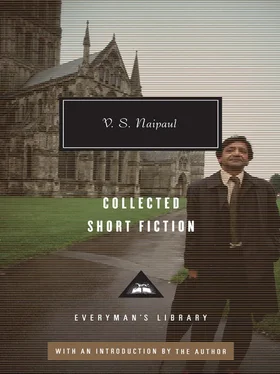V.S. Naipaul
Collected Short Fiction
The stories in Miguel Street were begun by a man who had everything to learn about writing and himself. The writing ambition had come very early to me, but it had always been only a kind of warm glow inside me, giving me the vaguest idea of what I might do. The writing ambition had come without the wish to do a particular kind of book, and so it stayed for years. I didn’t even know in the beginning what kind of writer I might be. Was my gift a comic one or was it profounder? I wrote many stories in this blank period, but nothing like a book announced itself to me. I did attempt a book; I attempted two books; but the creative fog refused to lift. The first book I attempted was a version of Black Mischief , giving it a Trinidadian setting. I managed, with a kind of self-induced blindness, to take this to the end in the long vacation, writing very fast when the end was in sight. One man said it was ‘phoney Waugh’. I suffered at that, and marked this man down both for his wit and the soundness of his judgement. I believe the book was actually presented, by a very kind friend, to a London publisher, but fortunately for everyone it was turned down.
It seemed to me as a result that farce or comedy was not what I was meant for, and the next book I attempted three or four years later was extremely serious. I had no story; I thought I should do an account of a day in the life of someone such as I had been. The book lumbered on and on. When I left Oxford I took this dreadful half-book with me to London. I had had the good fortune to land a little editorial job at the BBC. This job not only saved me from destitution; it also put me in touch with real writers and real critics, and I had the folly or the vanity to send my manuscript to one of those people. He sent it back almost by return post and said that I should forget this work. It was very wounding to me; especially as it was so close to what I had begun to feel about the book. And it was with this great depression, of rejection and general hopelessness, that one afternoon, in the freelancers’ room in the Langham Hotel, then a part of the BBC, I sat before one of the big typewriters and started the first story of Miguel Street . I had no idea where I was going, but somehow the idea had come to me that I should not leave the freelancers’ room until I had finished the story. My life as a writer until then had been full of beginnings, and it would have added to my gloom to make yet another false start.
The next day I began and finished a second story, and the day after that I did a third. These stories had the same imaginative setting, were written in the same tone of voice, in the same spare language, and were in fact part of a vision I didn’t know I possessed as a writer until the moment of writing. After a few days — of immense excitement — the stories became too long to be completed at a sitting. The stories had to be carried in my head until the following day, and sometimes for days. It was new to me to carry work with me for many days; and without my knowing it, without understanding what I had let myself in for I in this way learnt something about the nature of writing. The reader of this book can follow this process of learning and discovery in the stories of the Miguel Street sequence. He may think I claim too much for the stories, but I am speaking here of something very personal, something that tipped me over from despair into beginning to be a writer.
This is a process that happened in my own mind and will not be easy to explain. Until I had begun Miguel Street I had been obsessed with style and language, and had worked very hard to master that aspect of the craft. I had read and tried to learn from many of the approved masters, Defoe, Swift, Dryden and even a few of the moderns who had come my way — the now-forgotten H. M. Tomlinson among them. I suppose they all helped in a way, but they didn’t take me nearer to becoming a writer. They didn’t take me nearer into understanding what my material was going to be. In fact they made it harder for me to have an idea of the value of my own material; their metropolitan glamour was too great.
The Miguel Street stories seemed to write themselves. I didn’t step back to consider myself writing, and it was hard for me to understand where I had got that tone of voice. Many years later I thought the voice came from the Castilian, and especially from the sixteenth-century picaresque novel Lazarillo de Tormes . I had studied and greatly admired this book in the sixth form. Later I was to translate it. I was hoping that the Penguin Classics might want to do it; but after a little initial encouragement it was not to be. But the effect of all this was that the tone of the old Spanish book sang in my head, and I am sure it helped me to get started.
The stories I was writing in this dreamlike way were of the life of a Port of Spain street. I had no idea where the stories would lead me, and the theme of the street and its life was part of the luck of that occasion in the freelancers’ room in the BBC. I had worried a great deal about arriving at my material. This luck undid that worry. To write about the street, which I of course knew, was to be flooded with material, an embarrassment of riches, folk myths, folk songs, newspaper stories, all worked on now by transforming memory. My concern when I began had been with language, a wish to raise my language above the language of the school essay, and to turn it into something closer to the writing one might come upon in a book. Yet, miraculously this concern with language led to narrative, to writing at length. It led me very close to having an idea of the book. I had begun, as I said, to carry the material in my head, and insensibly the stories became longer. I didn’t know where I was going. The story of ‘The Enemy’, published here in a later section, was written as a part of Miguel Street. At this stage I was sufficiently in control of my material to understand that it was wrong for the Street . I kept it apart, then and later, and I was glad that I did so because three years later it led me to one of the stronger scenes of a much more important book, A House for Mr Biswas . To have used the material in another way would have been to lose it. So I was given a sense of what I was doing and was no longer as keen as I might have been earlier to bulk out a book. Inevitably the stories of Miguel Street came to an end; it became important to look for a publisher.
In a better-ordered world the stories of Miguel Street would have excited a publisher. The publisher I was dealing with was indeed excited; he wanted to publish me, but he had the publisher’s wisdom about short stories. He said that they never sold. He wanted a novel before anything else and so I spent the rest of the year trying to write a novel. It was four years before Miguel Street was published, and — alas for the publisher’s wisdom — it has never been out of print, earning its regular fifty percent for the publisher. The stories that were done later need no apology; I consider them part of my work.
Three or four of these stories, however, deserve a special word. I was in India at the time, writing Mr Stone and the Knights Companion in a small lake hotel in Kashmir. I had an arrangement with my London bank whereby they regularly sent me money. It occurred to me one day — out of an abundance of caution, as the lawyers say — to write to the bank to find out how my money was holding up. They replied in a frightening and unexpected way that my money had almost run out.
‘The Baker’s Story’ and ‘A Christmas Story’ were written out of that ensuing panic. They were written on the typewriter at a great rate, and almost nothing was corrected. I have written nothing else in this way, and I suppose it was possible because I had trained myself to write carefully during the writing of Miguel Street .
Читать дальше









